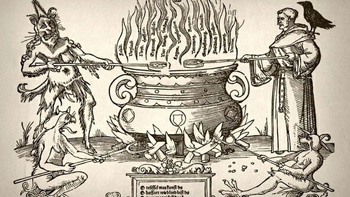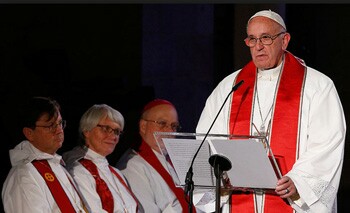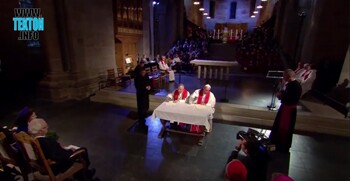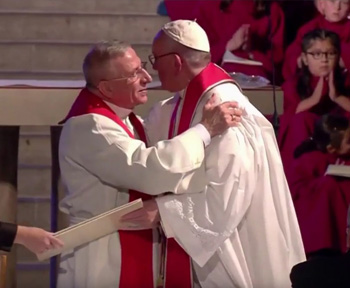WHEN "THE POPE" BECOMES LUTHERAN
Atila Sinke Guimarães
Commenting on Luther, Koch wrote: “The question of God and the Christocentrism of the announcement are fundamental and very positive in Luther; and we Catholics still have much to learn about these themes.”
Koch continues, quoting Francis: “The ‘original intention’ of the Father of the Reformation was not to ‘break the unity and create new churches,’ but rather was ‘centered on the way to announce God.’” (L’Osservatore Romano, October 31, 2016, p. 6 – my translation)
So, both the Pope and most qualified official of the Holy See on this topic say that Luther has been misinterpreted by the Catholic Church. Indeed, what is implied is that the Council of Trent and the 450-year Church teaching that Luther was a heretic were wrong and obtuse.

Luther cooks his doctrine in the same fire of revolt where the Devil cooks his - a 16th century cartoon
However, when we examine the vague words of the Bergoglio/Koch duo, we see there is nothing new in them: When they say that Luther was “centered on Christ,” what they mean is that he denied the mediation of the Catholic Church as well as of Our Lady and all the Saints as a means to reach God. That is to say, it is a reaffirmation of the age-old Protestant pride that pretends every member of their multiple sects is exalted enough to stand before God without any mediator.
The duo’s words – Luther was “centered on God” – also try to justify his cry of revolt against the hierarchical institution of the Church and especially against the Papacy: Los von Rom – away from Rome.
Next, the “Christocentrism of the announcement” is nothing but the Protestant’s central focus of preaching the Bible in the Mass. It is a consequence of the theory of the “two tables” defended by Luther and his partisans. According to this error, the Mass should not be centered on the Sacrifice of Christ or on the Eucharist, but on the “communion on two tables” – the banquet of the people celebrating Christ’s coming and the related preaching.
This banquet is not to be confused with the reception of the Eucharist after the Transubstantiation in Catholic Masses because Protestants reject the dogma of Transubstantiation. This banquet is a mere exaltation of the people as the most important element of the service.
So, the praised “Christocentrism of the announcement” is an indirect way to deny both the sacrificial character of the Mass and the Transubstantiation. Only here, we already have two enormous heresies.
What the duo Koch/Bergoglio affirmed in that article is nothing new. They repeated the same grotty Protestant heresies of the past, presenting them from an ecumenical-“merciful” viewpoint.
In Lund with the Lutherans
Now, let us go to Lund, where Francis delivered a speech and signed a common declaration.
The mains points of the Lund speech are these:
- “In this crucial moment of our history, we have the possibility to
make reparation [for the past division] and move beyond the
controversies and misunderstandings that have often prevented us from
comprehending one another.”
The use of the term “misunderstanding” is fraudulent. There were no misunderstandings in the past, but rather a clear and complete opposition on essential points of doctrine. The presentation of the past doctrinal confrontations as “misunderstandings” is to fool Catholics and invite them to accept what comes in the next points. - This division “was perpetuated by men of power of this world more than by the will of the faithful people.”
Again, we find an offense against the Council of Trent and the many Saints who led the fight against the Protestants, including St. Ignatius of Loyola and Pope St. Pius V.
Pope Francis delivering his speech at the Lutheran temple in Lund - Salt + Light Television - “We closed in on ourselves out of fear or prejudice toward the
faith which others profess with a different accent and language.”
This is also false; Catholics had no fear. They fought bravely in defense of our Holy Faith. This affirmation is to set the mood to attract victims to the concessions Francis will make. - “With gratitude we recognize that the Reformation has helped give
greater centrality to Sacred Scripture in the life of the Church.”
This repeats what the duo Bergoglio/Koch said the day before, which we already analyzed above. - “Luther’s spiritual experience calls to us and reminds us that we can do nothing without God. … With the concept of ‘by grace alone [we are saved],’ he reminds us that God always takes the initiative, prior to any human response, in the very moment in which He arouses a response. The doctrine of justification, therefore, expresses the essence of human existence before God.” (L’Osservatore Romano, October 31, 2016, p. 4)
We see, now, that this devotion was engineered to merge with Protestantism on this particular point.

Francis signing a Catholic-Lutheran declaration in Lund, above; kissing the leader of the Lutheran World Federation, below - Snapshots from video by Texton

- “If anyone shall say that the free will of man, moved and aroused by God, does not cooperate by assenting to God who arouses and calls him so that he is disposed and prepared to obtain the grace of justification, and that he cannot dissent if he wishes, but is an inert being that does absolutely nothing and is merely in a passive state: let him be anathema.” (Session VI, Decree on Justification, chap. 16, canon 4; Denzinger 814)
- “If anyone shall say that justification is nothing but confidence in the divine mercy which forgives sins for Christ’s sake, or that it is this confidence alone by which we are justified, let him be anathema.” (Ibid., canon 12; Denzinger 822)
As for the Common Declaration Francis signed with the Protestants, it is just a more superficial repetition of this speech, with the addition of a “social” conclusion. It calls on both Catholics and Lutherans to defend human rights, welcome refugees and struggle for ecology.
Endtime Prophecy (Sr. Jeanne): Vatican 2 False Religion
